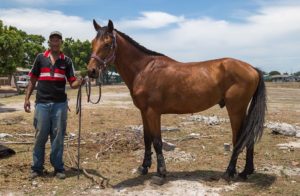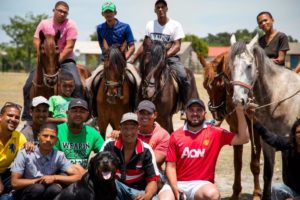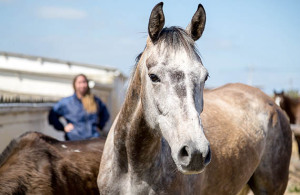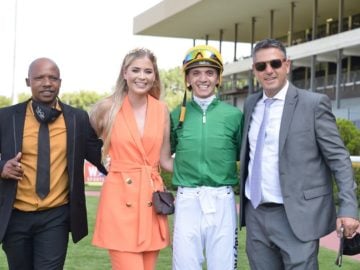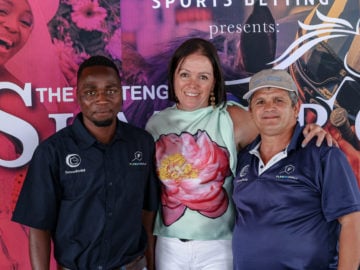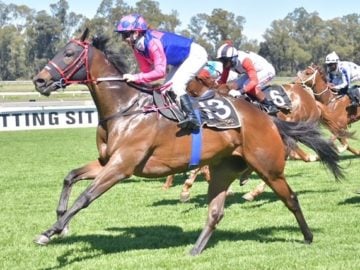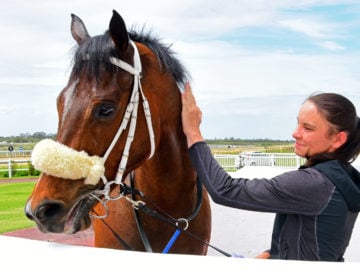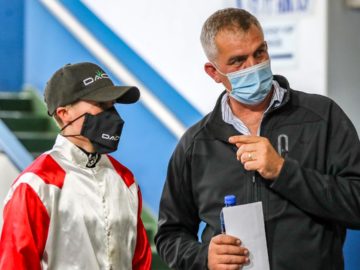It’s been a while since Fantasia / Coalmine Canary was pulled out of a watery Cape Flats ditch one rainy August night in 2013. We have had numerous calls and emails requesting a follow up and as it’s the season and all that, we decided to catch up with Fantasia and see how she’s doing.
Thanks to a herculean effort by the SPCA Horse Care Unit staff and a wonderful support network of vets, farriers, care givers and fans, Fantasia had recovered sufficiently from her ordeal to be adopted out and leave the SPCA on 30 September 2013. Fantasia, along with her companion pony Ou Toppie were both adopted by her case worker Romayne Midgley and taken to their forever home in the Dassenberg area to continue her rehab.
Fantasia and Ou Toppie were very bonded initially and he played a big part in her rehab. However, Ou Toppie soon befriended Bones, another resident pony who has lost his sight. As Fantasia grew stronger and more independent, Ou Toppie transferred his responsibilities to Bones and Fantasia found a new group of friends. Romayne says it took a good six months of careful feeding, treatment and care before Fantasia came sound again, but once she did, Romayne started working her on the lunge. She says Fantasia took to it really quickly and was so kind and generous about everything that one day she just hopped on bareback and took Fantasia for a little swim in their dam. “That’s how it started really. Although she’s mainly used as a hack, I have popped her over little jumps here and there and there’s nothing I’ve ever asked that she won’t do.”
Fantasia is in light work, schooling once a week and hacking out twice. Her daily routine is morning turnout with her group of friends. All the horses get brought in for lunch and then all get to graze on a large lawn camp in the afternoon before being brought in at night. Along with the other farm horses, Fantasia also gets a monthly beach outing to splash around in the cold water.
About Romayne
Romayne grew up in Johannesburg in a horsey family – her mother had a Welsh stud, did dressage and carriage driving and her father was a polo player, while Romayne has always been keen on jumping and eventing. Romayne originally received a bursary to study veterinary science, but 4 years into her degree, the bursary was scrapped and she had to go back to the drawing board. She applied to Wits to do a BCom and then a BProc and eventually went into conveyancing. When she relocated to the Cape, her horses came too, mainly stabled in the Dassenberg / Philadelphia rural area, before Romayne and her husband Nick eventually purchased their own property there. Although the initial plan was just to house her retired show jumper, there are now 24 horses on the property, most of which have been ‘scraped off a road somewhere’, as Romayne puts it.
The welfare work started gradually. “I was not initially all that interested, it was more outrage at seeing how the horses were being treated. I was probably one of those crazy members of the public that I deal with on a regular basis now! I was forever calling the SPCA and then always criticising how they worked, so eventually Allan Perrins said fine, why not come and see what it’s like at the coalface.” Romayne worked for the SPCA for 9 months, during which time she became acquainted with the ‘bush racing’ fraternity (illegal, unregulated racing conducted in urban areas).
Lost City
“Bush racing was very big in Atlantis at the time, but they fall in a little pocket that is not covered by either the Grassy Park or the Swartland SPCA. Seeing what went on and how the horses were treated, it quickly became my passion. I was very opposed to the racing and initially went to help with first aid. Racing took place on Wednesdays, Fridays, Saturdays and Sundays. The horses that finished first and second qualified to go through to the next race. They literally race until they drop. I administered fluids and electrolytes as well as treating any abrasions and injuries when horses fell down.”
“I appealed to the local horsey community and started collecting leavings from racing stables and competitive yards. I still do – the Milnerton guys are great and Andries Steyn in particular is one of our biggest supporters. When I realised that horses were being brought in from Epping and Delft to get fed and treated and that I was inadvertently helping grow racing in the area, I started refusing to help any actively racing horses.”
Purpose-bred
She explains that the majority of the horses belong to local residents who still use them as a means of transport. The horses are also used for stock work like rounding up cattle and sheep for local farmers. It is not an affluent community, and there is rarely money for the sort of feed we are used to seeing, so for the most part, horses are turned out onto nearby farmland and left to scrape a living on whatever forage they can find.
The local horses are tough, hardy crossbred types, which the community is gradually developing into a distinctive breed called the West Coast Horse. Despite the harsh conditions, these tough little horses seem to thrive and can happily manage their stock work with the odd night’s racing with relatively few ill effects. The popularity of racing created a demand for Thoroughbreds. While they were good for racing, they are not cut out for being working horses or fending for themselves and usually don’t survive very long.
Romayne decided to address the issue by promoting the use of the West Coast Horse and reducing the demand for Thoroughbreds in Atlantis. By befriending the horse-owners and sticking to her policy of not assisting any horse actively racing, racing has mostly stopped in Atlantis (although it still continues in areas like Epping and Delft). And because Thoroughbreds have proved themselves so unsuited to the Atlantis environment, there are now only have a handful left.
Security
Unfortunately, gang culture is rife, with one gang in particular making it a condition of initiation that new members have to steal a horse. Prospective gang members will then go onto the nearby mountainside, catch a horse and then use it to joyride. This is where the majority of the injuries happen as the riders are unskilled and they will often deliberately damage or mutilate a horse in a show of dominance. This horse theft has led to horse owners bringing their horses back into the urban area for security. It is an interesting scenario, with horses back on the streets and open urban spaces, Wild West style, but oddly means that the Atlantis community are exposed to horses on a daily basis and have developed a deep horse culture.
However, horses in cramped urban areas create smells, attract flies and because the majority are ungelded, it’s also quite a noisy business and unhorsey neighbours are quick to complain to the council. To try and save neighbour relations as well as trying to feed their animals, horses were turned out onto communal green spaces, which in turn left them vulnerable to theft again.
Solution
It is not a wealthy community and with little to do after school, it is easy for neighbourhood kids to be drawn into drugs and other delinquent behaviour. The community innovatively solved both problems simultaneously with the invention of jockits. Jockits are kids from the local community, tasked with care taking the horses during the day and working their way towards earning rides and working with the horses on weekends.
Getting Organised
Romayne confirms that anything to do with horses attracts immediate attention and she says if you pull into town with a horse box or come to treat a horse, one is soon surrounded by children. She has started training the jockits in basic first aid and along with their jobs as horse ‘security guards’, they are her eyes and ears and first line of defence in treating sick horses.
The system has worked so well that the local horse owners have organised themselves into a formal club called the Atlantis Youth Horse Owners Association. The association has a formal council, chaired by Reagan Fortuin, they are registering members and in so doing, they are able to manage the horses as well as assist and advise owners more effectively. There are even three officially recognised studs, tasked with improving the West Coast Horse and in time, they hope to have it officially registered with the Stud Book. The Association has recently registered as an NPO and has petitioned the local council for land to keep their horses on. “At first we were bumping heads a lot,” explains Romayne. “Fortunately, we have an open-minded ward councillor by the name of Cynthia Clayton, who was persuaded to come out and assess the situation first hand. After a couple of horses made their way into the fresh produce section of the local Pick & Pay and a few weeks later ended up at the reception of the local hospital, she was persuaded to help. Councillor Clayton has allocated a portion of land that we can have for a minimal rental on a 99 year lease. We are now trying to raise funds to build a stabling complex to house our working horses.”
Community effort
The jockit system is also proving very popular with the local community and interestingly, it is mainly boys that join. “New recruits usually get nominated by their friends,” explains Romayne. “From there, Reagan and I will meet with the parents. We are very strict on academics and all our kids need to prove that they are attending school and maintaining their grades – we ask to see their reports at the end of every term. A lot of call out work is done between 6 – 8pm so it’s important that their parents are comfortable with that and also that they manage the kids’ homework around that. If their grades drop, they are not allowed to spend time with us until they start improving. The parents really like it – if the kids don’t pull their weight, or misbehave, they are threatened with losing their riding privileges. We often get calls saying ‘so and so has done this and is banned from the horses for a week.’ It’s surprisingly effective.”
The boys are very keen to learn and have proved quick studies. They are wonderfully capable riders and are proving to be adept horsemen. As there is limited funding for medical work, the majority of the horses are entire and with no money for saddles or things such as saddle fitting, they do without and most of the riding is done bareback and they cope admirably. By assisting Romayne on her rounds, the jockits are becoming proficient in first aid as well as basic diagnostics. Once she has carried out an initial visit, assessment and treatment, Romayne can confidently hand over the bulk of the treatment to a jockit. One little boy named Jerry has become so proficient that he now has a stocked backpack that he carries around permanently and he and his pony are known as the local ambulance.
It is a fascinating slice of local culture and one that seems well worth supporting. If anyone would like more information or would like to help, please contact Romayne by email on [email protected].
Incredible to think that all of this stemmed from one grey mare lying in a Cape Flats ditch. They say saving a horse may not change the world, but it does change the world for that horse. In Fantasia’s case, it seems she may well change the world after all.
‹ Previous




